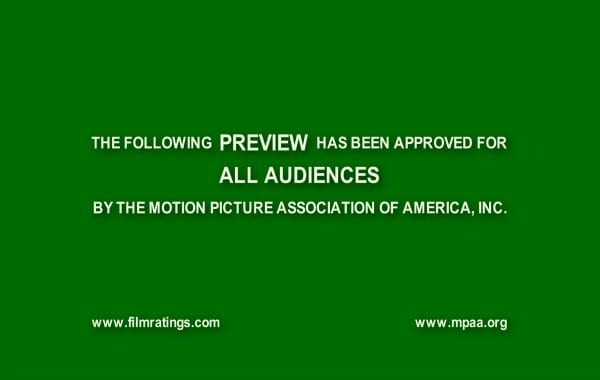According to The Hollywood Reporter, the National Association of Theater Owners is pushing for stricter self-enforced industry rules regarding the length and content of film trailers. The suggestions they’ve floated are merely proposed guidelines so far — according to some reports, NATO was testing the waters to gauge studio reaction — but if adopted, they could significantly alter, perhaps enhance, the moviegoing experience.
NATO, by the way, was formed in 1965 when the two largest existing theater-owner trade organizations merged, and the abbreviation (which it of course shares with the North Atlantic Treaty Organization) was probably even more hilariously self-aggrandizing and inapt then. Also, “trailers” are so-called because they were briefly — in a time before marketing evolved into the conniving, canny science it is in today’s post-Don-Draper world — shown following films and, though it didn’t take long for marketing execs to wise up and show the ads to captive, pre-film audiences, the name stuck.
The NATO push is the result of what they claim is widespread complaining from moviegoers regarding both the length of trailers, generally, and the superfluous amount of plot or action revealed. One oft-cited example is the trailer for Fast & Furious 6 and its reveal of the movie’s muscle-car-exploding-from-nose-of-plane sequence.
Their platform centers on restricting trailers to two minutes. This would be a full thirty seconds less than the current self-regulated industry standard set by the MPAA of two and a half minutes. Studios are also granted a yearly exemption for major-marquee films, one notable example being this year’s Warner Bros. joint Man of Steel’s third official trailer, which clocks in at a stout three minutes and two seconds.
Given that studios already grant themselves exemptions for their largest marketing blitzes, it’s unlikely anyone is going to impose any restrictions that will concretely and significantly scale back the biggest advertising frenzies, at least not without the studios signing up for it. There seems to be little incentive for them to do that.
The other two prongs of the NATO proposal (see? doesn’t it sound weird, anyone born before 1985?) are more interesting than the length-reduction suggestion, though no less likely to be willingly adopted. NATO wants to limit marketing schedules to the four months preceding a film’s release for all but the most major, blockbuster-type promotional campaigns, additionally requiring that all promotional material include a concrete release date.
Studios might have an incentive to collectively agree to shorter promotional cycles, since they’re currently involved in an advertising arms race (NATO? Get it?) in which everyone shouting over the collective marketing din increases the volume of the noise, which increases the volume of the shouting, etc. The latter provision would mean less of the shoot-the-moon style, “Coming Soon (but really in, like, two years)” advertisements, but these really aren’t the ads that customers in theaters are — supposedly — complaining about.
This is coming right after the MPAA changed the format of its green-bar pre-trailer disclaimers — have you noticed? I still feel like I’m in a parallel universe every time I see one of the new “Appropriate Audiences” cards — and it seems like odd timing, that trailers should end up in the news cycle multiple times in a two-month span. The proposed restrictions would probably make the moviegoing experience more enjoyable, or at least more tolerable, but I don’t expect studios to line up in support of restrictions on their advertising campaigns, and without studio support, the ideas are most likely going to die in subcommittee, as it were.
Kevin is the newly-appointed, first-ever Blog Editor for the University of Houston's campus newspaper, The Daily Cougar. He writes movie reviews, and totally abuses the early media-screening plus-one privileges by turning them into cheap, snooty dates whenever possible. He has what the literature refers to as, 'a bit of a gambling problem,' so don't make careless wagers with or at him, please.






